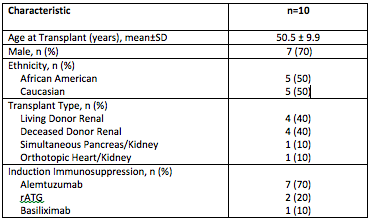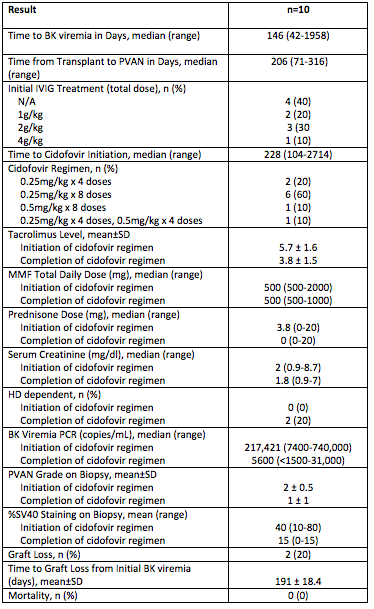Protocol Cidofovir for Refractory Polyomavirus Associated Nephropathy in Kidney Transplant Recipients
J. Clark, A. Haririan
University of Maryland Medical Center, Baltimore, MD
Meeting: 2019 American Transplant Congress
Abstract number: C265
Keywords: Graft function, Kidney transplantation, Polyma virus, Viral therapy
Session Information
Session Name: Poster Session C: Kidney: Polyoma
Session Type: Poster Session
Date: Monday, June 3, 2019
Session Time: 6:00pm-7:00pm
 Presentation Time: 6:00pm-7:00pm
Presentation Time: 6:00pm-7:00pm
Location: Hall C & D
*Purpose: Dose-limiting nephrotoxicity has historically precluded the use of cidofovir for polyomavirus associated nephropathy (PVAN). With incidence of BK viremia in kidney transplant recipients increasing at our center over the past year, we sought to describe the impact of protocolized cidofovir for refractory PVAN.
*Methods: Renal transplant recipients between 2010-2017 with biopsy-proven PVAN and BK viremia who received cidofovir were included.
*Results: In the study period, 10 cases of cidofovir treatment for PVAN were identified. Select characteristics and treatment details are outlined in [Table 1]. 90% of patients received lymphocyte-depleting induction therapy. All patients underwent reduction of maintenance immunosuppression and 60% of patients received IVIG prior to cidofovir initiation. Cidofovir was administered at a median of 228 (104-2714) days post-transplant, with pre and post-administration fluids, and without probenecid. At initiation of cidofovir treatment, subjects had mean SV40 staining of 40% (10-80) on biopsy, BK viremia of 217,421 copies/mL (7400-740,000), and creatinine of 2mg/dL (0.9-8.7). At completion of cidofovir treatment, mean SV40 staining decreased to 15% (0-15), median BK viremia decreased to 5600 copies/mL (<1500-31,000) and creatinine decreased to 1.8mg/dL (0.9-7). [Table 2]. While two patients suffered graft loss, one was attributed to both mixed rejection and PVAN.
*Conclusions: After decreasing maintenance immunosuppression, and after IVIG treatment, cidofovir is reasonable to consider for refractory PVAN in kidney transplant recipients.
To cite this abstract in AMA style:
Clark J, Haririan A. Protocol Cidofovir for Refractory Polyomavirus Associated Nephropathy in Kidney Transplant Recipients [abstract]. Am J Transplant. 2019; 19 (suppl 3). https://atcmeetingabstracts.com/abstract/protocol-cidofovir-for-refractory-polyomavirus-associated-nephropathy-in-kidney-transplant-recipients/. Accessed February 8, 2026.« Back to 2019 American Transplant Congress


